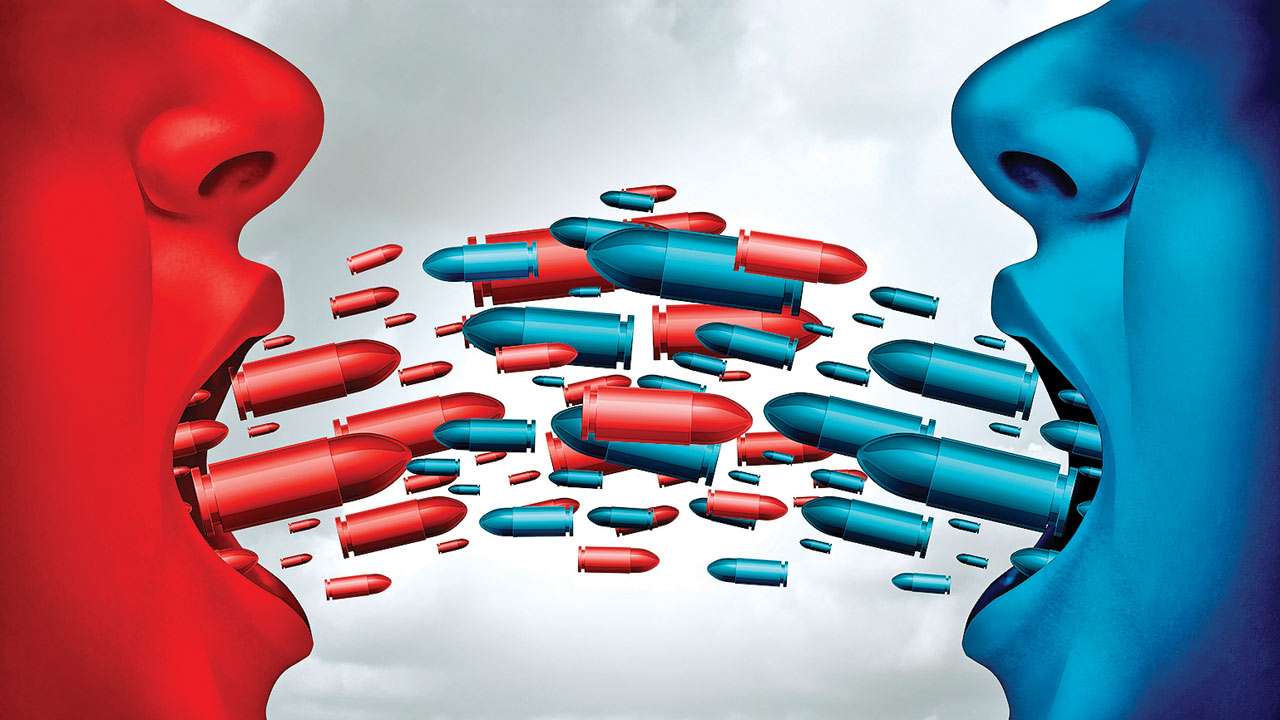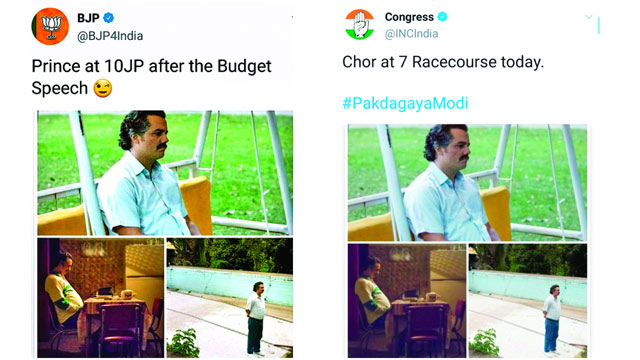
Just hours after the Interim Budget was presented on February 1, the ruling party's official Twitter handle posted a three-photo collage that showed the lead character of a Netflix series Narcos in a contemplative mood. In case you are wondering why the caption gave away the context: "Prince (Rahul Gandhi) at 10JP (his residence 10 Janpath) after the Budget Speech." Responses to the tweet added a comical quotient to the political discourse of the day.
What the BJP Twitter handle shared was a meme called the "sad Pablo Escobar meme," widely used to highlight sadness and frustration and anticipation. However, @BJP4India's "meme attack" on the Congress chief was not an isolated instance. If anything, it was yet another reminder of the mainstreaming of memes in India's political pow-wow.
The meme phenomenon began in the early 2000s when User Generated Content (UGC) came to dominate the Internet. The growth of social media networks in the last decade helped them become an integral part of popular culture.
"The youth loves to share quirky and funny memes," says Yamini Krishna, a PhD scholar in EFL University, Hyderabad. "By sharing memes, they find ways to engage with peers," she adds.
However, the popularity of memes, might have to do with short attention spans. A 2017 Microsoft research highlighted how the average human attention span is now down to eight seconds from 12 seconds in 2000. This decline has meant a profusion of visually attractive eyeball-grabbing memes.

Instant gratification, humour and relatability come together in a combination that works better than long-winding facts and figures-laden analytics making them a big draw across the political spectrum. The Opposition's attempts to keep tearing into the government at every opportunity fueled the creation of many hilarious memes online. Recently, a prominent Right of Centre Facebook page posted a meme inspired from the poster of a Bollywood film, which lampooned an Opposition leader. Meanwhile, a satire page turned the #10YearChallenge into a meme mocking the government. "Memes are the best thing that's happened to political discourse. Their humorous touch makes apolitical people take notice of political happenings," comments Irfan, whose page Drunk Journalist takes an anti-establishment stand.
In Irfan's comment, is hidden a key question: do memes really help raise political awareness among the youth? Shriyam Dalal, a young Mumbai-based architect agrees. "Memes have definitely kept me informed about the latest happenings in India's politics. It's mainly through Facebook and memes that I get the latest news and happenings." Like Dalal, 21-year-old Kolkatan engineer Vishal Mishra, also credits memes for his interest in politics. "I neither like nor have the time for TV news. I prefer memes."
Sandesh Samant, who teaches a media course at Mumbai's Ruia College, calls the culture of memes "a welcome change," as they connect with young people, and help to bring them into the political climate." But does this translate into political preferences? Dalal and Mishra say no. Samant too insists politically-loaded meme shares rarely go beyond their entertainment value. In fact, there is no conclusive evidence to suggest that memes directly impact the political choices of the youth.
Rahul Raj, who runs the Facebook page Bhak Sala, is also sceptical about the impact of memes' on youth. "Without following the right people online and internalising nuances, this can only add to the uninformed polarisations we see breaking all over social media," laments Raj.
Since memes go viral, they help content creators generate high traction on pages. Irfan concurs: "I always try to put the message across the board using memes to engage, reach, share and like. This has more chances of getting multiplied, compared to an article or just a post." This virality and popularity among the internet-savvy may have encouraged the largest Opposition party to ride the wave. Since January, the principal Opposition party has posted at least a dozen memes on Instagram, including one that uses footage from the 1980's classic The Shining to mock Demonetisation.
Abhishek Asthana, popular for his witty Twitter handle @GabbbarSingh, credits the Opposition party for upping their meme game. Yet, he opines that memes against the largest Opposition party continue to get more traction. "They are created for free by many content creators who just seek creative validation on social media."
Memes have, however, been blamed for their superficiality, since the limited space they offer lead to oversimplification of issues. "Memes do not carry arguments. They are simply opinions. One cannot learn about the situation by simply looking at memes," says Krishna. "A layer of humour obfuscates the fake news they carry. A picture is worth a thousand words, but a meme, which is one picture with five words is one thousand and five words," quips Asthana.
Four decades ago, evolutionary biologist Richard Dawkins coined the term 'meme' in relation to his theory of genetic evolution. However, Dr Limor Shifman, one of the foremost experts in the field of online humour, has traced their evolution to the early 2000s. The Israeli academician says that memes are increasingly becoming a platform for political communication since they are easy to create and spread. "One only needs to have basic digital knowledge and sense of humour," Shifman says, adding, "Memes help people express their individuality and collectivity simultaneously. They help people with similar views to come together and form a political block online," she continues.
"Politicians across democracies try to assimilate into popular culture as well as add humour in their campaigns," says Shifman, who has authored (2013) Memes in Digital Culture. But even though memes may end up complimenting political cartooning, she believes that the latter may never completely disappear as it brings a different set of narrative to the table.
The Occupy Wall Street movement became an inspiration for scores of memes across the world. A slogan which became (popular) during the movement, "We are the 99%", referring to concentration of wealth and power with just one percent of the population, continues to inspire meme makers.
Meme Lord/Meme Master: A meme creator; someone who shows a strong passion for memes.
Dank memes: According to Urban Dictionary, 'dank' is often used to describe a meme in which the comedy is excessively overdone and nonsensical, to the point of being comically ironic.
Ashish Merkhed, State head for IT & Social Media head, Maharashtra BJP
The BJP has been utilising memes since the last two-three years. Memes will help us attract first and second-time voters, who frequently consume them on social media platforms, in the run up to the Lok Sabha election. However, the older generation of voters may not really be attracted to memes. Our unofficial fan pages have over 1 crore followers. These pages also often post memes to spread our message.
Recently, we posted a meme that garnered around 1,200 shares and recorded more than six lakh views. The important point is that we did not even promote it. That is the power of memes. We have been getting extremely positive feedback on memes from youngsters, which we believe will also convert into crucial votes in the upcoming polls.